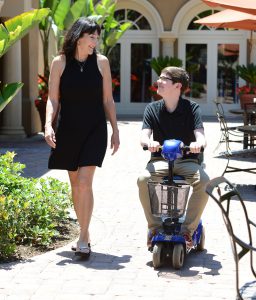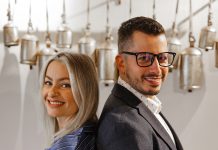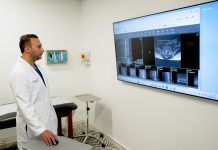
In February of 2020, Newport Beach-based CureDuchenne – a global nonprofit aimed at saving the lives of 300,000 children and young adults living with Duchenne muscular dystrophy, the most common and severe form of muscular dystrophy – held its annual Napa in Newport fundraiser just days before the pandemic prompted a wave of closures that shuttered in-person events.
“We were one of the few charities who had their signature event right before the shutdown, and we say thank you to the universe for that,” said CureDuchenne Founder and CEO Debra Miller of Newport Beach. “We have been busy on the research front—we have not missed a beat. It’s incredible how quickly we were able to pivot to virtual, although fundraising has been tough.”
Miller said that the pandemic provided CureDuchenne with the opportunity to pull back on some of its programs, refocus and put more thought into how the organization was managing and launching new programs.
“We have three major programs within CureDuchenne,” explained Miller. “One is research, another is the CureDuchenne Cares program, which is a family and healthcare education initiative that is multifaceted. The third is CureDuchenne Link, a comprehensive research platform that incorporates a biobank along with patient and medical records, which started right before COVID-19. Unfortunately, collecting biospecimen samples was not possible over the past year, but this was such a critical initiative for the organization it forced us to slow down, look at the systems in place, and revamp how we were going to go about the initiative before anything was set in concrete. We’re pleased that we launched CureDuchenne Link on July 9. The response has been extremely positive.”
Research has accelerated like crazy, said Miller, because people have been accessible and available.

“We have funded two projects already this year, and six projects last year during the pandemic. Often, we go in early before a company forms, when it’s just science, and we try to provide funding that will give them an answer or proof of concept—is there a reason to believe that this gene therapy or this molecule could work?”
After that, the fledgling companies are able to go to venture capitals, other biotech companies and pharma companies and raise the big funding needed to move toward clinical trials, explained Miller.
“We will, for example, provide that early funding to get some answers and data, and then they have the data to go to the big funders and get the $30 million it takes to run a phase one trial,” said Miller.
In addition to the initial funding, Miller said CureDuchenne also brings scientific expertise to the table.
“Sometimes the scientists in the small companies know a lot about Duchenne but they don’t know about drug development,” said Miller. “They don’t know how to get a drug through the pre-clinical phases and the regulatory bodies and everything that has to happen to get a drug approved. We have a chief scientific officer that has actually worked in big pharma and gotten drugs developed and approved. We bring a lot of expertise other than just money. We become integrated into the ecosystem of patient research.”
Miller said CureDuchenne is able to fund this research because of people who attend their fundraising events and through the generosity of philanthropists who see the value in what they’re doing as an organization.
“Because we have the venture philanthropy model, we take donor dollars and we then invest those funds into these small companies and, if they are successful, we get a return and then reinvest the gains into subsequent research,” said Miller. “The first company in which we invested was bought by another company, and we were able to take the return from that and fund five different projects.”
Their average investment of a million dollars is a lot of money, noted Miller, but it’s a drop in the bucket of what it costs to get a drug developed. Fortunately, donors understand that CureDuchenne can leverage their donated dollars by luring venture capital and pharma companies to come in and invest follow-on funding with the massive amount it takes to get a drug approved.
One bright side of COVID-19, said Miller, is that people now understand more of what goes into developing a drug.
“What happened in 10 months to develop a 95 percent effective COVID-19 vaccine for the collective good is remarkable,” said Miller. “But with COVID-19, not all cases are fatal. With Duchenne, 100 percent of patients are going to die. A cure for Duchenne is possible, but you have to dedicate significant resources now to see the cure tomorrow. I would love for the population to realize that while COVID-19 is an emergency, Duchenne is an emergency too.”
Miller said her organization has funded gene replacement therapies, which works well with younger boys. Miller’s 24-year-old son, Hawken, who has Duchenne muscular dystrophy, is not eligible for these clinical trials because he has aged out of the inclusion criterias, so they are working on other ways to deliver the gene therapy for older boys (Duchenne occurs primarily in males).
Ultimately, said Miller, “I would love for people just to be interested and say, ‘I’d like to learn more, I want to see how you have been successful multiplying dollars to find a cure for a rare disease, and we are going to cure this disease.’”
Successful Duchenne Initiatives
Among the programs CureDuchenne has been involved with is the DuchenneXchange (www.DuchenneXchange.org), a dedicated platform for the Duchenne community to learn, listen, connect and explore. All Duchenne stakeholders, including patients, families, organizations, scientists, advocates, health care professionals, and pharmaceutical companies, are invited to participate and share credible resources and information as well as get the support they need from diagnosis to clinical trials and treatment.
The DuchenneXchange has an improved infrastructure and functionality sponsored by CureDuchenne.
“We noticed a tremendous need for a platform that can be private to our community,” said Miller. “The needs of the community are always first and foremost in our programs. As the infrastructure sponsor, our support of the DuchenneXchange builds on this and provides a place where the community can come together without fear of politicized, misinformed or incorrect comments.”
CureDuchenne has also launched CureDuchenne Link (www.cureduchennelink.org), a centralized data hub that puts individuals with Duchenne and Becker (another form of muscular dystrophy) firmly at the center of research. More than just a registry or biobank, CureDuchenne Link directly connects data and biosamples provided by the Duchenne and Becker muscular dystrophy community with scientists and drug developers around the globe.
According to a CureDuchenne press release, by reducing the search for data connected to biosamples and removing barriers that typically cost researchers and drug developers time and money, CureDuchenne Link looks to accelerate exploration into new gene therapies, exon-skipping and other targeted Duchenne therapeutic development. Now clinicians, researchers and drug developers worldwide have access to a single, unified, HIPAA-compliant platform for a holistic view of biosamples integrated with clinical, genomic and patient reported data.
“With the launch of CureDuchenne Link, we hope to break down existing information silos and offer qualified researchers access to participant data and biosamples in one all-encompassing platform,” said Miller. “Duchenne and Becker are complex diseases with thousands of mutations. To effect real change, we need research into every one of those mutations. We turn to the entire community for help and encourage them to participate in a monumental shift for research and treatment development.”
Two signature CureDuchenne fundraising events return this fall: the 10th Annual Getzlaf Golf Shootout on Saturday, September 11 at Monarch Beach Golf Links, and Napa in Newport on November 6 at the Waldorf Astoria Monarch Beach Resort.
For more information on CureDuchenne, including the upcoming events and ways to get involved with the organization, visit www.cureduchenne.org.




